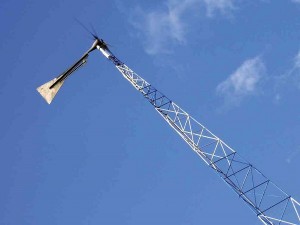From blackouts to food shortages: Why the Philippine clean energy sector needs a boost

WIND turbine for home use generates electricity. The benefits of converting to clean energy will be felt in the long run, after the initial investment is paid off. Photo By Ma. Esther Salcedo-Posadas, Contributor
Former Senator Heherson Alvarez thinks that the world is so close to what is known as the “tipping point” where even the food chain will be directly affected.
He mentioned a UN report that cites the Philippines as the third most vulnerable country with regard to the impact of climate change, mainly because of the country’s geographical location and nature as an archipelago.
In that 2007 study led by Dr. Rajendra Pachauri, head of the Intergovernmental Panel on Climate Change, Alvarez cited the following: it was concluded in the report that carbon dioxide is the culprit of warmer climates. At that time, the earth had warmed up by 1.4 degrees centigrade and it was estimated that a tipping point would occur with an additional 2 degrees. He further explained that the tipping point would lead to hotter climates, bleaching of corals, plankton (fish food) dying, fish also dying from lack of food and eventually humans not having enough fish and protein supply.
He thus reiterated the drastic need for carbon to be reduced and alternative energy such as wind, solar, and hydro to be used.
According to Alvarez, the Philippines is actually a low carbon consumer at around 1.5 to 3 tons per person while the United States uses around 12 to 14 tons per person. Unfortunately, the Philippines is the first victim of global warming since the country experiences numerous weather disasters such as typhoons.
Article continues after this advertisement“Let’s aim for zero carbon,” he says. He gave the example of Costa Rica that uses predominantly clean energy that they plan to reach that target in a few year’s time.
Article continues after this advertisement“There is a dominant minority that is profiting from the old system,” laments the former senator with regard to the Philippine scenario. He feels that many decisions are made to satisfy short-term goals.
He mentions that the Maria Cristina hydroelectric plant in Mindanao currently lacks around 500 megawatts and the immediate solution found was to use more fossil fuel energy. He believes that investing in a clean energy water turbine may be the better path. He explains that it could take a few years to pay off the investment but in the long run, the cost of running the electricity would be zero.
“Long term disaster planning should prevail over short term benefits. Profits should be drawn on long term social calculations.” Alvarez admits that there is a wide difference between the cost of electricity obtained from coal versus clean energy, with coal being the cheaper alternative. Thus, there is a need to make real sacrifices in the beginning.
He also believes that the feed-in-tariff is not beneficial in the long run: “Feed-in-tariff would be self defeating. It’s restrictive for the full entry of alternative fuel especially if there’s a breakthrough.”
In summary, Alvarez concludes that there is little time left before the full impact of climate change will be felt. The clean energy industry is a completely new arena that few people even understand the dynamics. And yet the clock is ticking.
Former Senator Alvarez is acknowledged as the father of the climate change movement in the Philippines. He is a commissioner of the Philippine Climate Change Commission that is headed by President Aquino. The group is tasked to formulate policies on climate change for the Philippine government.